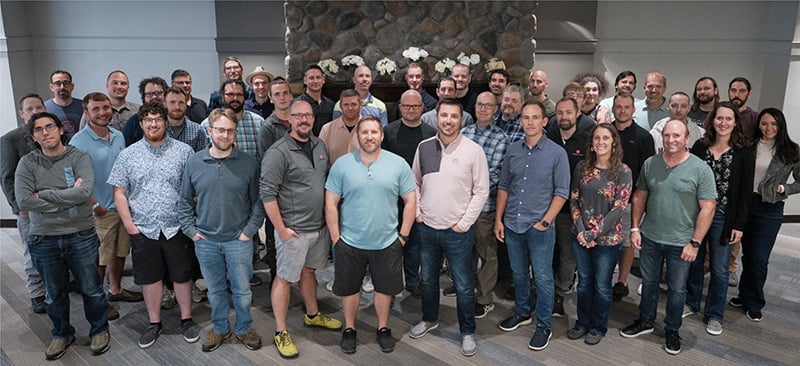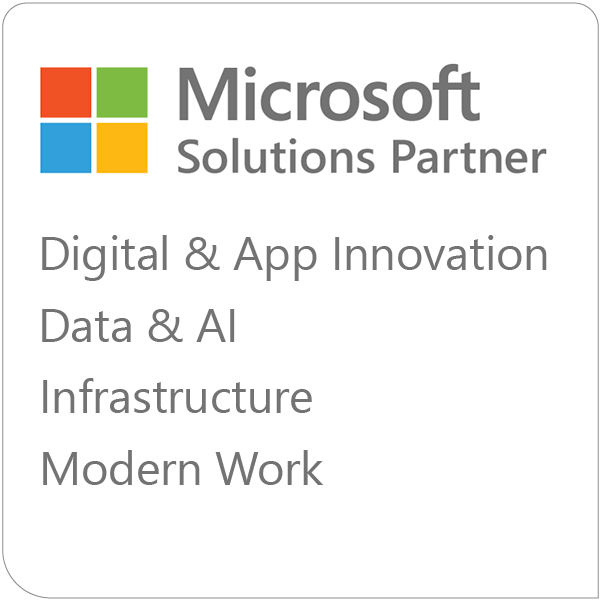In This Blog
- What’s New in .NET 9.0?
- .NET Aspire: Simplifying Cloud-Native Development
- AI Integration: Smarter Applications, Faster Development
- ASP.NET Core Enhancements
- Entity Framework Core: Better Support for NoSQL
- Performance and Scalability Improvements
- Why Upgrade to .NET 9.0?
- Real-World Applications of .NET 9
- Ready to Upgrade?
- Frequently Asked Questions
The tech world never stands still, and neither does .NET. With the release of .NET 9.0, Microsoft is helping developers push performance boundaries, scalability, and productivity. In my opinion, it’s their best version yet. But how can you maximize on the recent improvements?
I’m Juan Barahona, a software engineer here at Emergent Software. I work mostly with .NET technologies, and I’m really passionate about open source. I’ve contributed to projects like ASP.NET Core, .NET Core, and a bunch of related libraries.
I love solving problems and sharing helpful tips with my peers and clients. That’s why I’m happy to share this guide, walking you through everything new in .NET 9.0.
What’s New in .NET 9.0?
.NET Aspire: Simplifying Cloud-Native Development
One of the standout features of .NET 9 is .NET Aspire. This new feature makes it incredibly simple to go from an MVP to a production-like environment in minutes. It streamlines local development by handling complex configurations like databases, caches, and AI models.
.NET Aspire acts as an orchestrator, allowing developers to define an application’s architecture and let the framework handle the rest. This helps to ensure seamless connections and efficient deployment to the cloud. By reducing the complexity of configuring essential components, developers can focus on writing code instead of troubleshooting environment setup. This makes .NET Aspire especially valuable for teams working with distributed systems and microservices.
AI Integration: Smarter Applications, Faster Development
AI continues to revolutionize software development and .NET 9 makes AI integration incredibly easy. Microsoft has introduced new AI building blocks, including Microsoft.Extensions.AI and Microsoft.Extensions.VectorData. These extensions allow developers to seamlessly add AI-powered functionalities like speech recognition, structured data extraction, and vector queries.
These enhancements also make it easier to implement AI-driven decision-making, chatbot interactions, and advanced analytics. Developers can now use AI with minimal configuration, allowing businesses to rapidly prototype and deploy AI-powered solutions.
ASP.NET Core Enhancements
ASP.NET Core received several significant updates, including:
-
Hybrid caching, which blends in-memory and distributed caching for optimal performance.
-
Optimized static asset handling with automatic fingerprinted versioning, ensuring the latest assets are always served.
-
Improved Blazor Hybrid and Web App templates, enhancing server-side rendering and client-side performance.
Fingerprinted static files ensure that applications always load the latest JavaScript and CSS updates, reducing caching issues. The improved Blazor templates make it easier to build cross-platform applications that share components between web and mobile interfaces. Hybrid caching offers a more flexible solution for managing state across different environments, improving scalability for high-traffic applications.
Entity Framework Core: Better Support for NoSQL
For those working with Azure Cosmos DB, .NET 9 brings major enhancements to Entity Framework Core like improved data access performance and more efficient queries.
These updates are really useful for applications that rely on large-scale, distributed databases, ensuring faster read/write operations and better indexing strategies. Organizations using NoSQL solutions might see reduced latency and improved scalability when managing large datasets.
Performance and Scalability Improvements
.NET 9 introduces multiple optimizations that boost execution speed and memory, including:
-
Loop optimizations and inlining improvements for better CPU utilization.
-
Arm64 vectorization, improving performance on ARM-based processors.
-
Advanced Garbage Collection, which dynamically adapts to application size, optimizing memory management.
The new garbage collection heuristics adapt to your application’s behavior, making memory management smarter and more efficient.
These improvements are especially important for cloud applications, where infrastructure efficiency directly impacts operational costs. Faster execution speeds lead to reduced server resource consumption, ultimately lowering hosting expenses.
Why Upgrade to .NET 9.0?
Upgrading to .NET 9.0 can help you unlock significant business value. Here are some key reasons to make the move:
-
Boosted Performance – Faster execution times and reduced infrastructure costs.
-
Lower Costs – Optimized memory and CPU usage lead to significant cloud savings.
-
Cloud-Native Capabilities – Enhanced support for Kubernetes and containerized applications.
-
Increased Developer Productivity – More intuitive APIs, improved debugging, and streamlined workflows.
-
Future-Proofing – Ensures compatibility with upcoming .NET releases and Microsoft’s ecosystem.
Even if you don’t refactor your code, just upgrading to .NET 9 can lead to immediate performance improvements and cost savings. We’ve seen companies reduce their cloud bills significantly just by upgrading.
Real-World Applications of .NET 9
.NET 9 is already proving its value for many of us in the industry. Here are some use cases:
-
Building high-performance APIs using ASP.NET Core 9.
-
Modernizing legacy applications with cutting-edge features.
-
Leveraging AI models for intelligent automation and analytics.
-
Deploying scalable microservices architectures with .NET Aspire.
Organizations adopting .NET 9 are seeing improvements in application reliability, security, and performance, making it a compelling choice for businesses looking to scale their operations.
Ready to Upgrade?
.NET 9 brings a wealth of improvements that can enhance your applications, optimize costs, and improve developer efficiency. Whether you’re looking to modernize legacy applications or build cutting-edge AI-powered solutions, Emergent Software is here to help.
Get in touch with our team today to explore how .NET 9 can transform your business.
Frequently Asked Questions
1. How difficult is it to upgrade to .NET 9?
If you’re already on .NET 8, upgrading to .NET 9 is pretty straightforward. Microsoft’s .NET Upgrade Assistant does most of the heavy lifting. If you’re coming from .NET 6 or .NET 5, you might need to handle a few deprecated APIs or update dependencies. For teams on .NET Framework, the jump is bigger—you’ll need to update project files and handle compatibility issues—but the documentation is solid, and the community is helpful. With some prep and testing, most teams can upgrade without too much hassle.
2. What are the key performance improvements in .NET 9?
.NET 9 brings noticeable performance gains across the board. You get better loop handling, smarter method inlining, and improved memory use thanks to adaptive garbage collection. There’s also stronger support for Arm64, which is a win if you’re using newer hardware or cloud infrastructure. These improvements translate to faster apps, lower memory overhead, and better performance overall—especially for compute-heavy or high-traffic workloads.
3. Does .NET 9 support AI development?
Yes, and it’s getting even better for AI. .NET 9 adds libraries like Microsoft.Extensions.AI and Microsoft.Extensions.VectorData that simplify working with models, embeddings, and semantic search. These tools make it easier to build intelligent features—like recommendations or NLP—directly into your apps. Combined with improved performance and cloud support, .NET 9 is well-suited for modern AI use cases.
4. How does .NET Aspire help developers?
.NET Aspire makes building cloud-native apps much simpler. It sets up your services, APIs, and background tasks in a consistent, connected way—handling things like service discovery, telemetry, and configuration for you. It also integrates well with containers and deployment tools, so you can get from development to production faster. If you’re building distributed systems or microservices, Aspire removes a lot of the friction.
5. What industries benefit the most from .NET 9?
Industries that need speed, scale, and reliability get the most from .NET 9. Finance benefits from low-latency data processing; healthcare relies on its security and compliance readiness; and SaaS platforms love the cloud-native tooling and performance boosts. It’s also a strong fit for AI, IoT, and analytics—anywhere you need modern, high-performing infrastructure.





